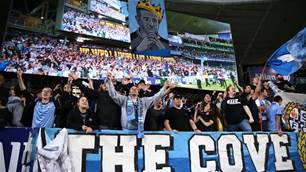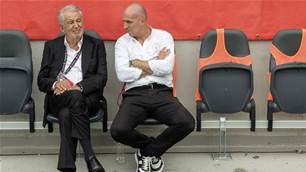Western Sydney Wanderers powerchair footballer Abdulla “Abz" Karim says winning the Most Valuable Player award at the recent 2017 Powerchair Football World Cup is the greatest achievement of his life.
“Getting into the semi-finals is a feeling that I can’t describe because it was the first time we have been in that position for powerchair football at international level.”
Unfortunately, France beat the Aussies in the semi-finals but Karim’s form did not go unnoticed and he was rewarded with the MVP award.
“It’s a feeling of shock,” he said when he heard his name read out.
“Your heart just drops, you’ve got no heartbeat in your chest and your ears start ringing a little bit and the sound goes away for a short time.
"I’m sitting in a wheelchair every day of my life and it’s like I’m sitting in an electric chair getting shocked.”
Karim said the enormity of receiving that MVP award took a while to sink in.
“I really didn’t know what it meant," he said. "It was only until the coach looked at me and he had a tear in his eye and said, ‘Do you absolutely know what that means or not? You are the best player in the world.'
"I just told him thank-you and I put my head against his head and it was just emotional. It’s the biggest achievement of my life and it feels so good having it.”

Karim counts Rale Rasic, who is a global ambassador for the sport, as a major influence.
“He is my inspiration and (won the MVP) for him,” he said. “He went to the 2011 World Cup with us in Paris when we came seventh in the world. I appreciate how much he is has done for the sport in Australia, not just Australia but pretty much around the world.”
Rasic could barely hold back his feelings when speaking about what Karim achieved only two weeks ago.
“This is a massive story, this is world news,” he said. “This is no ordinary story, this is an extraordinary story.
“Even with all my experience worldwide in coaching when I heard that he won the MVP, I became unbelievably emotional.”
“To be voted world’s best in a tournament amongst French, American and English teams - especially as these three nations dominate the world and for Australia to came fourth is an absolute phenomenal success.”
Rasic, who took Australia to their first ever FIFA World Cup appearance in 1974, described 26-year-old Karim as the Messi of Powerchair football.
“He has amazing technique,” he said. “When I spotted this kid one of the things I noticed was just how fast of a thinker he was. If he angles the chair the wrong way he will fly because that’s how light he is to some American or English players who are massive.

“He’s like a Messi, he so cheeky with his thinking. It is beyond belief how fast he is with his thinking and how he makes decisions that are always in his favour.
"When Messi is playing and gets hammered by the opposition he keeps on playing, he doesn’t give two hoots about anybody and this kid is just like Messi. In a world of his own. That’s what he is he is extraordinary.”
It’s difficult not be moved by Karim’s story especially when he reveals that he also has a heart problem he has to manage. But when he gets out on the court and is faced with opposition players who are double or triple his size, the 26-year-old is thinking of only one thing.
“I never have a fear, you always go in fearless,” he said. “The most important thing to me is the chair skill. I never lose focus of that.
“I control the chair with my left foot - between my two main toes. I’ve got no knee caps and I’ve got no arms but if you look at pictures of me it’s like I’ve got hands down the bottom.
“They aren’t up the top. They look a little bit like feet but they work like hands. That’s why the Australian team says I’m like their secret weapon.”
Powerchair football is currently not in the Paralympics, but Karim hopes the sport that gave him so much can be part of the program in the future.
“Playing in the Olympics would be unbelievable,” he said. “To be able to win a gold, silver or bronze medal would be phenomenal, it would be crazy.
“When I was younger I was a little smarta** but when powerchair football came into my life as I got older I matured more in the brain. It just helped me so much.
“The next step is to grow it in Australia and around the world also. If I can help the sport in any way then yes come to me I will do what I can to help the sport get bigger. The next step is also to get an A-League tournament happening in January.”
All pictures by Jeff Walsh/Quarrie Sports Photography
Related Articles

Sky Blues, Wanderers to clash in ALM first-round derby
.jpeg&h=172&w=306&c=1&s=1)
Wanderers pinch Kraev from ALM rivals Wellington













